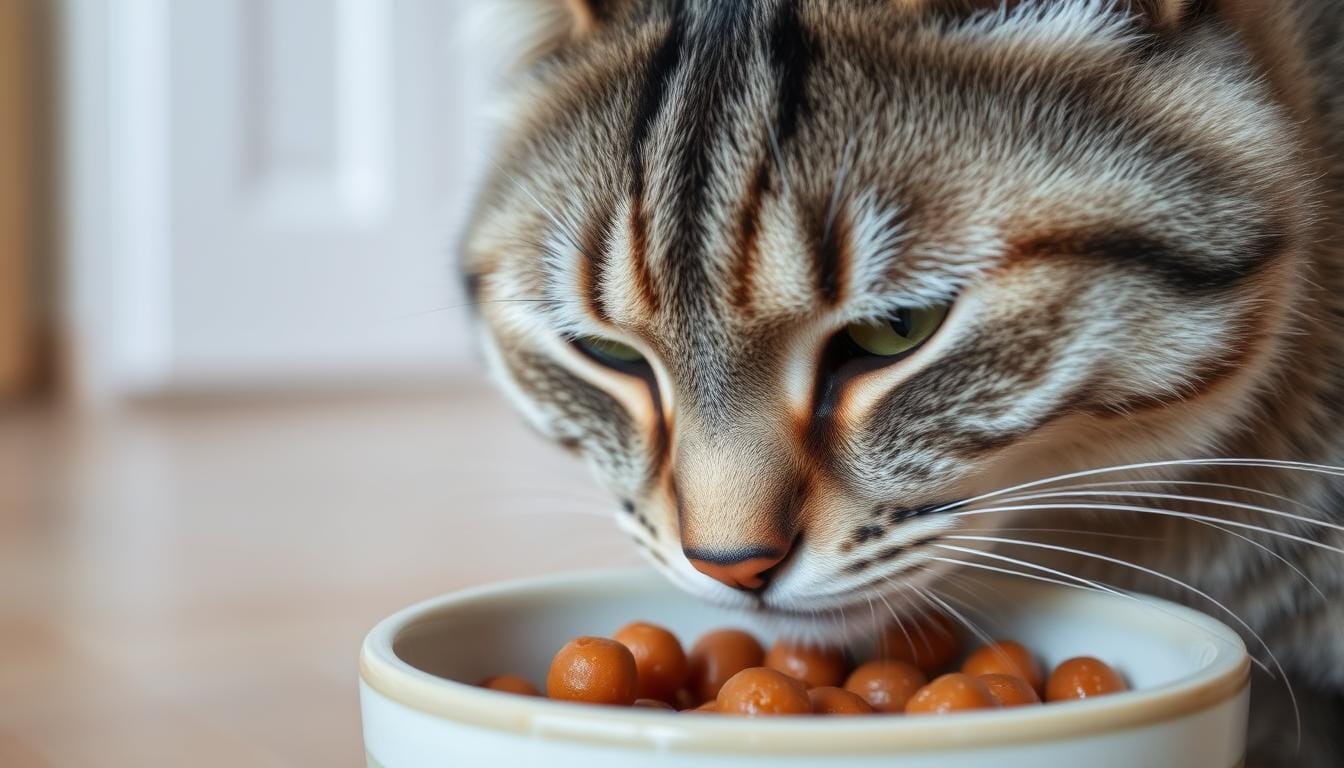
In this comprehensive guide, we’ll explore why specialized senior cat food matters, what key nutrients your aging cat needs, and review the top brands that veterinarians recommend. Whether your senior cat is experiencing weight changes, decreased activity, or developing age-related health issues, the right diet can make a tremendous difference in their wellbeing.
When Is a Cat Considered Senior?
Most veterinarians consider cats to enter their senior years around 7-10 years of age. By 11 years, cats are definitively in their senior phase. However, aging varies between individuals and breeds, with some cats showing signs of aging earlier than others.
The feline aging process isn’t as simple as the old “one cat year equals seven human years” myth. Cats age more rapidly in their early years, with the first year roughly equivalent to 15 human years. After that, aging slows somewhat, with each additional cat year representing about 4 human years.
Signs your cat may be entering their senior years include:
- Decreased activity and mobility
- Changes in weight (either loss or gain)
- Altered sleeping patterns
- Dental issues
- Changes in grooming habits
- Increased vocalization
Understanding when your cat reaches senior status helps you make timely dietary adjustments to support their changing needs.
Key Nutritional Requirements for Senior Cats
As cats age, their bodies process nutrients differently, and their dietary needs shift accordingly. Here are the essential nutritional components every senior cat food should contain:
High-Quality Protein
Protein becomes even more crucial as cats age. Senior cats often experience muscle loss (sarcopenia), making high-quality, easily digestible protein essential. Look for cat foods listing real meat (chicken, turkey, fish) as the first ingredient, with a protein content of at least 35-40% for dry food and 10% or higher for wet food.
Appropriate Calorie Content
Many senior cats become less active and experience a slowing metabolism, requiring fewer calories to prevent weight gain. However, some senior cats actually need more calories due to decreased ability to digest and absorb nutrients. The best senior cat food balances calorie content with nutrient density to address both scenarios.
Joint Support
Glucosamine, chondroitin, and omega-3 fatty acids help support aging joints and reduce inflammation. These supplements can ease discomfort from arthritis, a common condition in senior cats, and improve mobility.
Enhanced Digestibility
Aging digestive systems often become less efficient. Senior cat foods should be highly digestible with quality ingredients that are easy to break down and absorb. Prebiotics, probiotics, and dietary fiber support digestive health and nutrient absorption.
Hydration Support
Senior cats are prone to kidney issues and often don’t drink enough water. Wet food provides crucial moisture, helping to support kidney function and overall hydration. Even if you feed dry food, incorporating wet food into your senior cat’s diet is beneficial.
Essential Vitamins and Antioxidants
Antioxidants like vitamins E and C, along with taurine, support immune function and combat oxidative stress. These nutrients help senior cats fight age-related cellular damage and maintain overall health.
Top 5 Senior Cat Food Brands
After analyzing ingredients, nutritional profiles, and veterinary recommendations, we’ve identified the best cat food for senior cats across different categories. Each recommendation addresses specific senior cat needs while providing balanced nutrition.
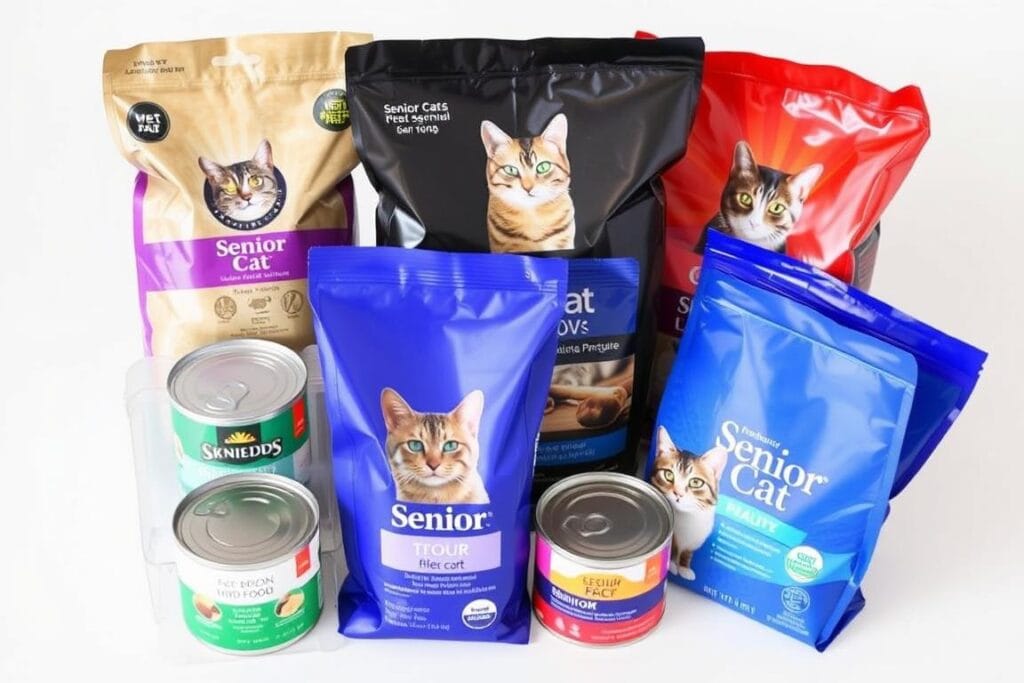
1. Hill’s Science Diet Age Defying Senior 11+ Cat Food
Hill’s Science Diet Age Defying is specifically formulated for cats 11 years and older. This premium formula contains a proprietary blend of antioxidants, omega-3 fatty acids, and essential nutrients that support brain function, kidney health, and immune response.
Pros
- Exceptional digestibility for sensitive senior stomachs
- Contains antioxidants that support cognitive function
- Available in both wet and dry formulations
Cons
- Premium price point
- Some cats may not enjoy the taste initially
Price Range: $25-$35 for a 7lb bag of dry food; $30-$40 for a case of 24 wet food cans
2. Royal Canin Aging 12+ Senior Cat Food
Royal Canin’s Aging 12+ formula is designed for very senior cats, with an adapted phosphorus level to support kidney function. The thin slices in gravy texture is particularly appealing to older cats who may have dental issues or decreased appetite.
Pros
- Excellent kidney support with controlled phosphorus levels
- Soft texture ideal for cats with dental issues
- Enhanced palatability for picky senior eaters
Cons
- Higher price point than average
- Limited protein sources may not suit all cats
Price Range: $35-$45 for a 7lb bag of dry food; $35-$45 for a case of 24 wet food pouches
3. Blue Buffalo Healthy Aging Mature Cat Food
Blue Buffalo’s Healthy Aging formula features real chicken as the first ingredient and includes their LifeSource Bits—a precise blend of antioxidants, vitamins, and minerals. This formula is free from by-product meals, corn, wheat, soy, artificial flavors, and preservatives.
Pros
- High-quality natural ingredients
- Contains glucosamine and chondroitin for joint health
- No artificial ingredients or fillers
Cons
- Some cats may not like the texture of LifeSource Bits
- Higher carbohydrate content than some competitors
Price Range: $20-$30 for a 7lb bag of dry food; $25-$35 for a case of 24 wet food cans

4. Purina Pro Plan Prime Plus Senior 7+ Cat Food
Purina Pro Plan Prime Plus is formulated with a proprietary blend that has been shown to improve and extend the lives of cats aged 7+. The formula includes a prebiotic fiber that promotes digestive health and a blend of antioxidants that support immune function.
Pros
- Excellent palatability for picky eaters
- Good value compared to other premium options
- Backed by extensive nutritional research
Cons
- Contains some by-products
- Higher in carbohydrates than ideal
Price Range: $18-$28 for a 7lb bag of dry food; $20-$30 for a case of 24 wet food cans
5. Wellness Complete Health Senior Cat Food
Wellness Complete Health Senior formula features deboned chicken and includes cranberries for urinary tract health. The recipe is designed to support the five signs of cat wellness: skin and coat health, digestive health, energy, immunity, and eye, teeth, and gum health.
Pros
- All-natural ingredients with no artificial additives
- Contains taurine for heart and eye health
- Balanced fiber content for hairball control
Cons
- Some cats may not prefer the taste
- Limited protein sources in the formula
Price Range: $20-$30 for a 6lb bag of dry food; $25-$35 for a case of 24 wet food cans
Senior Cat Food Buying Guide
Selecting the best cat food for your senior feline involves more than just picking a brand. Here’s how to make the transition smooth and ensure your cat gets the nutrition they need.
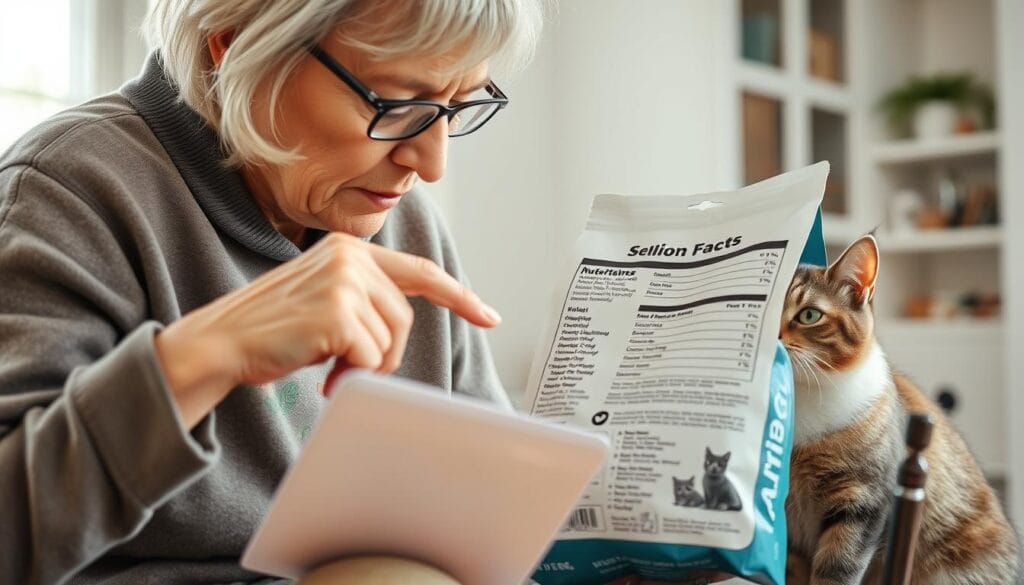
Transitioning to Senior Cat Food
Abrupt dietary changes can upset your cat’s digestive system. Follow this gradual transition schedule:
- Days 1-2: 75% current food, 25% new senior food
- Days 3-4: 50% current food, 50% new senior food
- Days 5-6: 25% current food, 75% new senior food
- Day 7 onward: 100% new senior food
If your cat shows signs of digestive upset during the transition, slow down the process and consult your veterinarian.
Portion Control for Senior Cats
Senior cats typically need fewer calories than their younger counterparts, but exact needs vary based on activity level, health status, and metabolism. As a starting point:
- Average-sized senior cats (8-10 lbs): 250-300 calories daily
- Larger senior cats (12-14 lbs): 300-350 calories daily
- Senior cats with hyperthyroidism or weight loss issues: May need up to 400+ calories daily
Divide daily portions into 2-3 smaller meals to support digestion and maintain stable blood sugar levels.
The Importance of Veterinary Consultation
Before making any significant dietary changes, consult your veterinarian. They can:
- Assess your cat’s specific health needs
- Recommend appropriate calorie intake
- Screen for age-related conditions that may affect diet
- Suggest prescription diets if necessary
Regular check-ups (ideally every 6 months for senior cats) allow for dietary adjustments as your cat’s health needs evolve.
Not Sure Which Food Is Right For Your Senior Cat?
Consult with your veterinarian to determine the best nutritional plan for your aging feline’s specific health needs.
Special Dietary Considerations for Senior Cats
Some senior cats have specific health conditions that require special dietary management. Here’s how to address common senior cat health issues through nutrition:
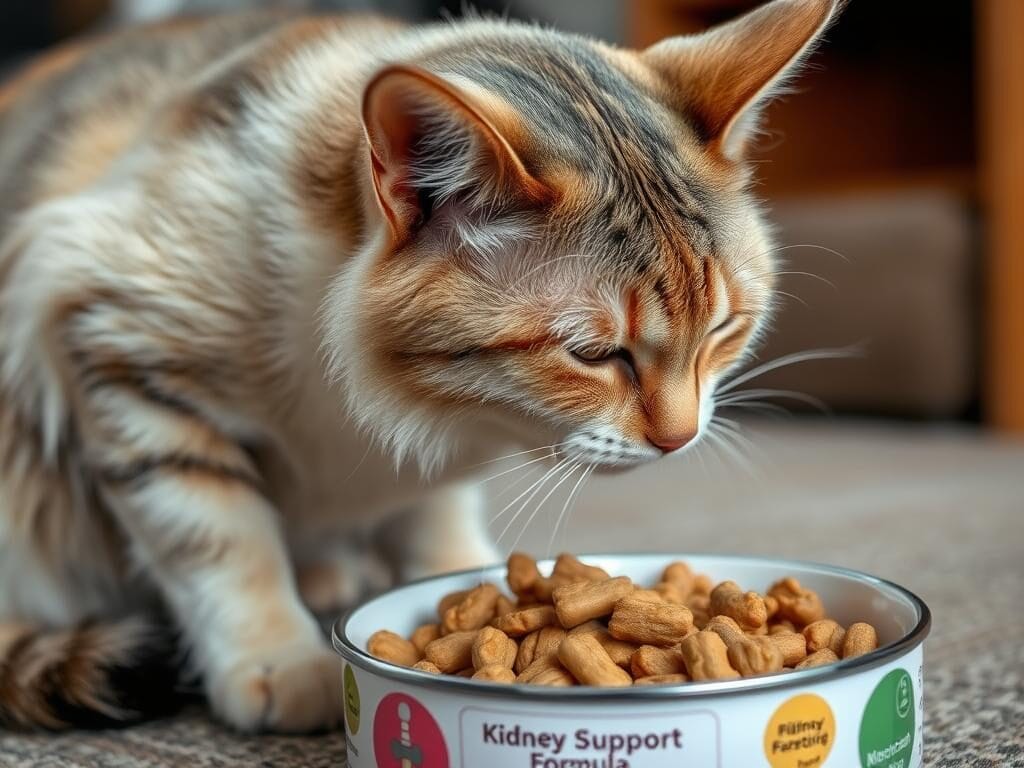
Kidney Disease
Chronic kidney disease affects up to 30% of senior cats. For cats with kidney issues, look for:
- Reduced phosphorus content
- Moderate, high-quality protein
- Added omega-3 fatty acids
- Increased B-vitamins
Prescription renal diets like Hill’s k/d, Royal Canin Renal Support, or Purina NF are specifically formulated for cats with kidney disease.
Diabetes
For diabetic senior cats, diet plays a crucial role in management:
- High protein, low carbohydrate formulations
- Consistent feeding schedule to coordinate with insulin
- Wet food to increase hydration
- Weight management formulas if overweight
Arthritis and Joint Pain
Many senior cats suffer from joint pain. Look for foods containing:
- Glucosamine and chondroitin
- Omega-3 fatty acids (EPA and DHA)
- Green-lipped mussel extract
- Adequate protein to maintain muscle mass
Dental Issues
Dental problems are common in senior cats and can affect eating habits:
- Soft pate-style wet foods for cats with missing teeth
- Small kibble size if dry food is preferred
- Dental formulas with texture designed to reduce tartar
Regular dental check-ups remain essential even with dental-focused diets.
Frequently Asked Questions About Senior Cat Food
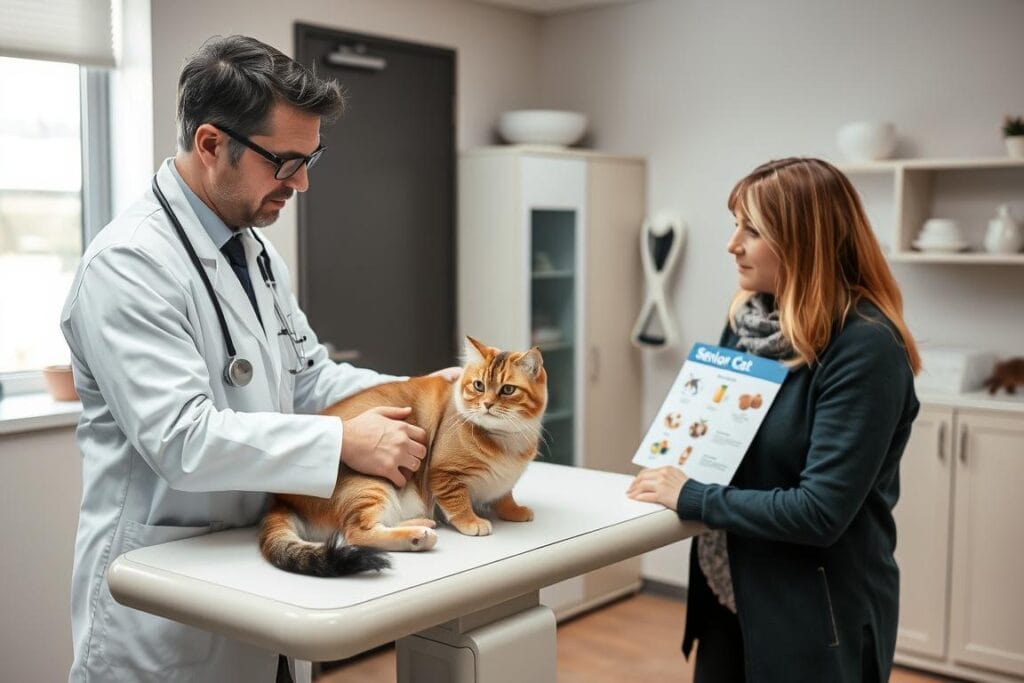
How often should I feed my senior cat?
Most senior cats benefit from eating 2-3 small meals per day rather than free-feeding. This feeding schedule helps maintain stable blood sugar levels and allows you to monitor food intake. Some senior cats with specific health conditions may require more frequent, smaller meals—consult your veterinarian for personalized recommendations.
Is grain-free food better for senior cats?
Grain-free isn’t necessarily better for senior cats unless they have a specific grain allergy (which is rare in cats). Some grain-free foods substitute other carbohydrate sources that may not offer additional benefits. Focus instead on overall nutritional quality, appropriate protein levels, and ingredients that address your senior cat’s specific health needs.
My senior cat is losing weight. Should I change their food?
Weight loss in senior cats should always be evaluated by a veterinarian, as it can indicate underlying health issues like hyperthyroidism, kidney disease, or dental problems. If medical causes are ruled out, your vet may recommend a higher-calorie senior formula, more frequent meals, or appetite stimulants. Never simply switch foods without understanding the cause of weight loss.
Is wet food better than dry food for senior cats?
Wet food offers several advantages for senior cats, including increased hydration, easier chewing for cats with dental issues, and typically higher protein content. However, some seniors prefer the texture of dry food. The best approach is often a combination of high-quality wet and dry foods, with emphasis on wet food for cats with kidney issues, diabetes, or dental problems.
When should I switch to a prescription diet for my senior cat?
Prescription diets are formulated for specific health conditions and should only be used when recommended by your veterinarian following diagnosis. Common conditions requiring prescription diets include kidney disease, diabetes, food allergies, and gastrointestinal disorders. Your vet will guide you on when to make this transition based on your cat’s specific health needs.
Conclusion: Nourishing Your Senior Cat for a Healthy Life
Choosing the best cat food for your senior feline companion is one of the most important ways you can support their health and quality of life in their golden years. The right diet can help manage age-related conditions, maintain a healthy weight, and provide the energy and nutrients your cat needs to thrive.
Remember that each senior cat is unique, with individual preferences and health needs. What works for one cat may not be ideal for another. Regular veterinary check-ups, at least twice yearly for senior cats, are essential for monitoring health changes and adjusting nutritional plans accordingly.
By understanding your senior cat’s specific nutritional requirements and choosing high-quality foods formulated for aging felines, you’re giving your faithful companion the best chance at a comfortable, healthy senior life.
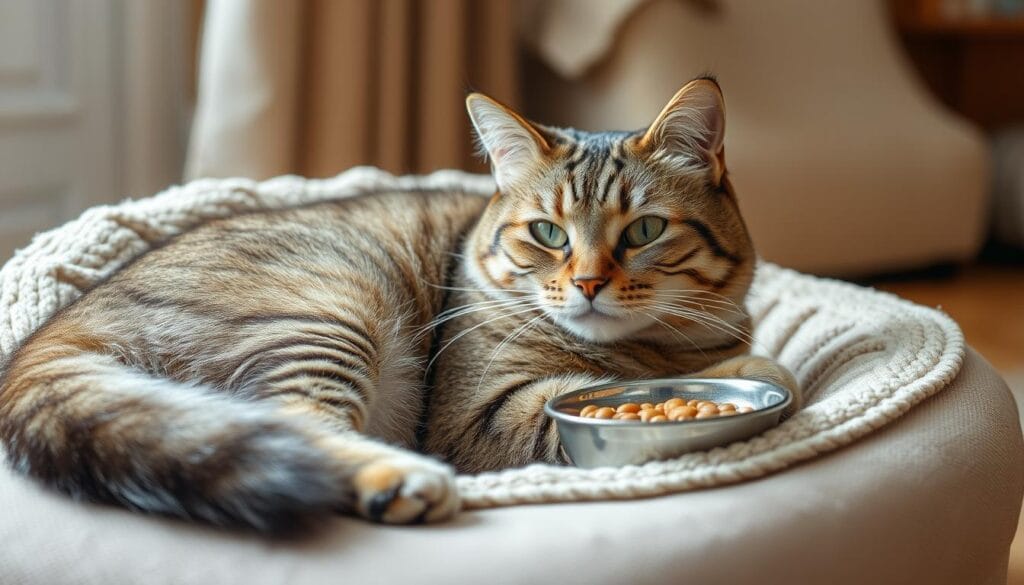
Ready to Improve Your Senior Cat’s Nutrition?
Start with one of our recommended senior cat foods and see the difference proper nutrition can make for your aging feline.



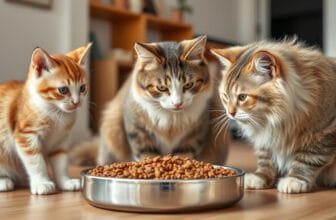
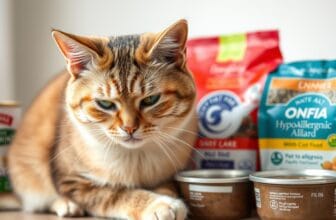
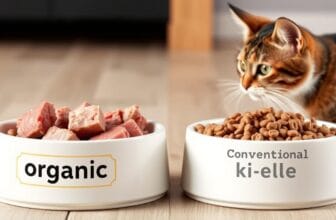
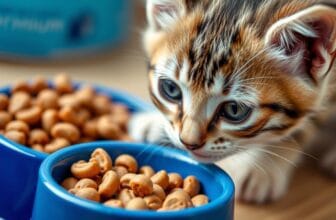

[…] cats need fewer calories and easier-to-digest food. Senior cat food supports joint health and has antioxidants for aging. Feeding them twice a day is good, but watch […]
[…] Senior Cat Nutritional Needs […]